|
|
|
Sort Order |
|
|
|
Items / Page
|
|
|
|
|
|
|
| Srl | Item |
| 1 |
ID:
082242
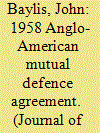

|
|
|
|
|
| Publication |
2008.
|
| Summary/Abstract |
Written on the 50th anniversary, this article focuses on the negotiations between Britain and the United States which led to the 1958 Mutual Defence Agreement and the beginning of the 'special nuclear relationship' which has lasted down to the present day. It is argued that the eventual success of the negotiations had a lot to do with the key roles of Eisenhower and Macmillan but that a transatlantic 'advocacy coaltion' of nuclear scientists, defence and intelligence officials also played an important part at the operational level in achieving and subsequently shaping the kind of relationship which developed. Attention is also given to the longer term significance of the agreement, especially in terms of the arguments about its impact on nuclear proliferation.
|
|
|
|
|
|
|
|
|
|
|
|
|
|
|
|
| 2 |
ID:
129103
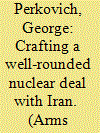

|
|
|
|
|
| Publication |
2014.
|
| Summary/Abstract |
A final nuclear deal with Iran should meet the underlying objective of the relevant UN Security Council resolutions since 2006: "the establishment of international confidence in the exclusively peaceful nature of Iran's nuclear programme."A final agreement could be codified and endorsed through a new resolution, which need not include all of the specific instrumental elements of past resolutions-for example, suspension of all uranium enrichment-if the council determines that the overall objective has been met. As the resolutions acknowledge, to be durable, such an agreement also must satisfy Iran's interest in having a purely peaceful nuclear program free from sanctions. The devilish challenge will be in the details. History will inform each party's requirements. The six-country group that has been negotiating with Iran, the so-called P5+1 (China, France, Germany, Russia, the United Kingdom, and the United States), will remember that Iran secretly had, at least until 2003, what appeared to be a dedicated, multifaceted program to acquire capabilities to produce nuclear weapons. Iran still has not cooperated fully with the International Atomic Energy Agency (IAEA) to clarify these activities and continues to expand sensitive fuel-cycle capabilities beyond any plausible civilian requirement. Iranian leaders, for their part, remember numerous episodes that reflect a U.S. determination to hasten an end to their regime.
|
|
|
|
|
|
|
|
|
|
|
|
|
|
|
|
| 3 |
ID:
133793
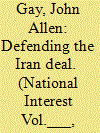

|
|
|
|
|
| Publication |
2014.
|
| Summary/Abstract |
Nuclear talks have yielded a framework that buys time for negotiation and reduces the risk of miscalculation on either side.
IT WAS LONG PAST MIDNIGHT IN GENEVA last November when the rumors began to fly. Iran and the world powers had just reached a deal on its nuclear program. An international crisis that had been building toward what seemed like war for more than a decade was now on the path to resolution. The deal, a haggard John Kerry confirmed, was real. It wasn't comprehensive-Iran would still be heavily sanctioned and heavily centrifuged-but it was unprecedented. All prior efforts had fallen apart.
|
|
|
|
|
|
|
|
|
|
|
|
|
|
|
|
| 4 |
ID:
185312
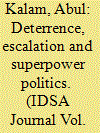

|
|
|
| 5 |
ID:
127622
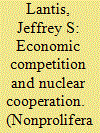

|
|
|
|
|
| Publication |
2014.
|
| Summary/Abstract |
The number of bilateral nuclear cooperation agreements surged during the "nuclear renaissance" of the past decade. This proliferation is only partially explained by the prevailing approaches that focus on strategic imperatives. To supplement these explanations, this study draws on neoliberal models of economic competition to posit that bilateral agreement negotiations also exhibit conditions of "uncoordinated interdependence" and maneuvering to gain market share. Case evidence suggests the contours of supplier state bids for civilian assistance are determined at least as much by considerations about economic competition as they are by positive strategic goals. In addition, this study identifies several cases of cooperation where there appears to be little or no strategic motive for export agreements. The study concludes that patterns of economic competition and the influence of peers in defined competitive spaces alter material payoffs and impact policies. It also identifies a surprising role for principled restraint in dampening strategic and economic competition in some dyads.
|
|
|
|
|
|
|
|
|
|
|
|
|
|
|
|
| 6 |
ID:
126520
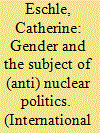

|
|
|
|
|
| Publication |
2013.
|
| Summary/Abstract |
This article aims to rehabilitate women campaigners against nuclear weapons as a focus of study and interlocutor for feminist International Relations scholars. Highlighting the recent tendency in gender and security studies to ignore or stereotype these campaigners, I first show how their critical re-investigation has been facilitated by recent systematizations of poststructuralist-influenced feminist methodology. In this light, I then revisit the discourses circulating in women's antinuclear activism in the 1980s before deconstructing in more detail the post-Cold War writings of Helen Caldicott and Angie Zelter. I argue that multiple, differently gendered constructions of the antinuclear campaigner were in play during the Cold War and have since been reconfigured in ways that reflect and reproduce the shift to a post-Cold War context and differences between the United States and UK. In such ways, then, women antinuclear campaigners continue to develop diverse oppositional subject positions in their efforts to challenge nuclear hegemony, in a discursive struggle worthy of attention from gender and security scholars as part of a broader, critical re-engagement with the gendered dimensions of nuclear politics.
|
|
|
|
|
|
|
|
|
|
|
|
|
|
|
|
| 7 |
ID:
157847
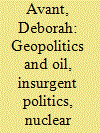

|
|
|
|
|
| Summary/Abstract |
This issue launches the third volume of the Journal of Global Security Studies. It begins with an article by Cullen Hendrix arguing that geopolitics conditioned the oil curse. Particularly, he claims that the negative impact oil production has on a country's democratic tendencies is less a timeless result of market dynamics and more a particular consequence of geopolitics in the transition from the Cold War. His reanalysis of data and case examinations of Azerbaijan and Georgia provide compelling evidence supporting both the magnitude of oil's post–Cold War effect and the logic of his claims.
|
|
|
|
|
|
|
|
|
|
|
|
|
|
|
|
| 8 |
ID:
131442
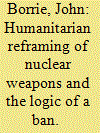

|
|
|
|
|
| Publication |
2014.
|
| Summary/Abstract |
The achievement of past international treaties prohibiting anti-personnel mines and cluster munitions showed that unpropitious political situations for dealing with the effects of problematic weapons could be transformed into concrete, legally binding actions through humanitarian-inspired initiatives. Although there is now renewed concern about the humanitarian consequences of nuclear weapons, some policy makers dispute the relevance of these past processes. This article examines how and why cluster munitions became widely reframed as unacceptable weapons, and the nature and significance of functional similarities with contemporary efforts of civil society activists to instigate humanitarian reframing of nuclear weapons and promote the logic of a ban treaty in view of its norm-setting value among states. In the case of cluster munitions, the weapon in question was signified as unacceptable in moral and humanitarian law terms because of its pattern of harm to civilians with reference to demonstrable evidence of the consequences of use. Ideational reframing was instigated by civil society actors, and introduced doubts into the minds of some policy-makers about weapons they had previously considered as unproblematic. This is relevant to the current discourse on managing and eliminating nuclear weapons in the Nuclear Non-Proliferation Treaty, in which there is dissonance between the rhetoric of those states claiming to be responsible humanitarian powers and their continued dependence on nuclear weapons despite questions about the utility or acceptability of these arms.
|
|
|
|
|
|
|
|
|
|
|
|
|
|
|
|
| 9 |
ID:
130876
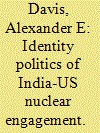

|
|
|
|
|
| Publication |
2014.
|
| Summary/Abstract |
Although its precise definition is contested, the concept of the 'Anglosphere' has grown in political discourse in the past decade. Anglospherist authors have defined it as a group of states tied together on the basis of shared tradition, laws, liberty and language. And yet they do not discuss India substantively, placing it firmly on the outside of its hierarchy. Others have argued the concept is based in a racialised, Anglo-Saxon identity. In 2005, Manmohan Singh surprised some domestic observers by emphasising India's positive connections to the 'English-speaking world' while speaking at Oxford University. Shortly after, India announced negotiations on a civil nuclear agreement with the US, leading to similar agreements with Canada, the UK and Australia. This article uses the contemporary India-US nuclear engagement to investigate India's position in relation to the ideational space of the Anglosphere and how this shapes India-Anglosphere relations. It is argued that India's postcolonial scepticism towards this space combined with the inherent anglocentrism in Anglosphere identity discourse limits India-Anglosphere relations while simultaneously animating nuclear engagement.
|
|
|
|
|
|
|
|
|
|
|
|
|
|
|
|
| 10 |
ID:
132931
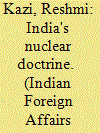

|
|
|
|
|
| Publication |
2014.
|
| Summary/Abstract |
The aim of India's nuclear deterrence capability has been to safeguard itself against blackmail and coercive diplomacy of adversaries. Its doctrinal principles of minimum nuclear deterrence and NFU are consistent with India's declaration of a modest nuclear weapons policy. The official announcements, in the aftermath of the May 1998 tests indicated that India has set out on a pragmatic course of action. Sixteen years after the tests, the Indian government's policies reflect this approach substantially.
|
|
|
|
|
|
|
|
|
|
|
|
|
|
|
|
| 11 |
ID:
096031
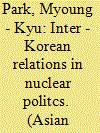

|
|
|
|
|
| Publication |
2010.
|
| Summary/Abstract |
This article aims at explaining the changes in inter-Korean relations since inauguration of the new administration in South Korea in 2008. By focusing on leadership, regime, and social factors in the two Koreas, the article emphasizes the social dynamics that are shaping inter-Korean relations despite the nuclear dispute. In the political realm, a tough stance toward North Korea's nuclear ambition by the South's government has created a sense of frustration within the North Korean leadership, causing tension and conflict with the South. In the social realm, however, both Koreas have been pressured by political and economic hardship and a growing sense of crisis among their citizens. From that latter perspective, however, the prospects are that the two Koreas will move toward more cooperative behavior. The role of nongovernmental organizations (NGOs) and the United States will be important in achieving that outcome.
|
|
|
|
|
|
|
|
|
|
|
|
|
|
|
|
| 12 |
ID:
131418
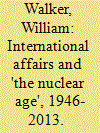

|
|
|
|
|
| Publication |
2014.
|
| Summary/Abstract |
The article reflects on the distinguished record of publication, in around 130 articles over nearly seventy years, on nuclear politics in International Affairs. Although constituting a small drop in the torrent of writings on nuclear matters since 1945, it can fairly be regarded as the most significant contribution to nuclear discourse by any journal outside the United States. The articles published in International Affairs have covered a wide range of issues including nuclear deterrence and strategy, arms control, non-proliferation and disarmament, and the policies-and drivers of policy-of countries, in particular the UK and US. Authors have included P. M. S. Blackett, Wyn Bowen, Alastair Buchan, Hedley Bull, Pierre Hassner, Michael Howard, Rebecca Johnson, Michael MccGwire, Michael Quinlan, Nick Ritchie, John Simpson and David Yost. The discussion concludes with Ian Smart's article of 1975 in which he contemplates the nature of the 'nuclear age' and its persistence or passing, and comments on governments' 'fatuous' attachment of prestige value to nuclear weapons.
|
|
|
|
|
|
|
|
|
|
|
|
|
|
|
|
| 13 |
ID:
130360
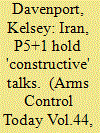

|
|
|
|
|
| Publication |
2014.
|
| Summary/Abstract |
Iran and six world powers held "constructive and useful" talks on a comprehensive deal on Iran's nuclear program, according to a March 19 joint statement released by the parties. A main topic of the talks between Iran and the six-country group, known as the P5+1 (China, France, Germany, Russia, the United Kingdom, and the United States), was Iran's uranium-enrichment program. The March 17-19 talks in Vienna were the second set of meetings between Iran and the P5+1 on a comprehensive deal on Iran's nuclear program after the parties reached an interim agreement in November. Implementation of the initial actions began Jan. 20 and is to last six months. If an agreement is not reached, the interim deal can be extended by mutual consent of the two sides. U.S. officials have said they hope to reach a final deal within the first six months. Iran maintains that its nuclear program is for peaceful purposes, but some countries are concerned that Iran could use its nuclear capabilities to develop nuclear weapons.
|
|
|
|
|
|
|
|
|
|
|
|
|
|
|
|
| 14 |
ID:
131181
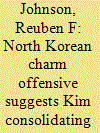

|
|
|
|
|
| Publication |
2014.
|
| Summary/Abstract |
Recent North Korean internal and foreign policy developments suggest that Kim Jong -un is consolidating his hold on power at home and is now focusing on foreign policy initiatives to enhanced his country's position in future multi party negotiation over its ballistic missiles and nuclear weapons programmes, and potentially end its international isolation,
|
|
|
|
|
|
|
|
|
|
|
|
|
|
|
|
| 15 |
ID:
168124
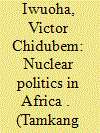

|
|
|
| 16 |
ID:
096027
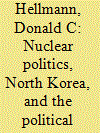

|
|
|
| 17 |
ID:
161330
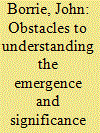

|
|
|
|
|
| Summary/Abstract |
This article examines the emergence of the UN Treaty on the Prohibition of Nuclear Weapons from a critical perspective, including how and to what degree efforts to alter states’ framing of nuclear weapons was a factor in the treaty's emergence and negotiation. It examines the so-called humanitarian initiative on the consequences of nuclear weapons, the activities of the International Campaign to Abolish Nuclear Weapons and the roles played by transnational institutions like the United Nations and the Red Cross Movement. In view of this case, lessons and limits on transnational advocacy network models of norm emergence are highlighted. In order to contribute to the process of better understanding the emergence and significance of the prohibition treaty process based on research, some areas are identified in which evidence gathering and theorizing are needed.
|
|
|
|
|
|
|
|
|
|
|
|
|
|
|
|
| 18 |
ID:
141315


|
|
|
|
|
| Summary/Abstract |
Iran’s domestic politics and power structure have been a source of puzzlement and conjecture since the country’s 1979 revolution, which toppled a U.S. ally and brought the Islamic Republic to power. This bewilderment intensified during the nuclear negotiations between six world powers collectively known as the P5+1 (China, France, Germany, Russia, the United Kingdom, and the United States) and Tehran.
|
|
|
|
|
|
|
|
|
|
|
|
|
|
|
|
| 19 |
ID:
130333
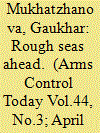

|
|
|
|
|
| Publication |
2014.
|
| Summary/Abstract |
From April 28 to May 9, states-parties to the nuclear Nonproliferation Treaty (NPT) will gather in New York for the third and final meeting of the Preparatory Committee for the 2015 NPT Review Conference.[1] Although it is unlikely that states will try to negotiate substantive recommendations for the review conference, the preparatory meeting is still an opportunity to take stock of developments and assess the condition of the regime as the treaty approaches the 45th anniversary of its entry into force.
More than a year away, the 2015 review conference is promising to be highly contentious, with the Middle East and nuclear disarmament at the center of tensions among the parties and progress on both issues viewed as a test of the treaty's credibility. The rapidly evolving initiative centered on the humanitarian impact of nuclear weapons is reshaping the traditional NPT debate, challenging the incremental approach to disarmament. The events unfolding in Ukraine may yet have a serious impact, reaffirming the belief among some that nuclear weapons or protection of a nuclear alliance are necessary for national security and further diminishing the possibility of any progress on disarmament. On the other hand, the crisis might help re-energize the discourse on the risks of escalation and use of nuclear weapons.
|
|
|
|
|
|
|
|
|
|
|
|
|
|
|
|
| 20 |
ID:
132904


|
|
|
|
|
| Publication |
2014.
|
| Summary/Abstract |
The trifecta of disasters in japan that unfolded on 1 1 March 201 1 strains credibility: a 9.0-level earthquake (the largest ever recorded in Japan), a thousand- year tsunami that devastated a 300-kilometer stretch of coastline in northeastern Japan, and three nuclear reactors in meltdown, exposing signi?cant portions of japan to potentially dangerous levels of radiation. In the aftermath of these unprecedented disasters, the meaning and signi?cance of this disaster have evolved. As Japanese government authorities and the general public alike have come to un(ierstand the nuclear disaster in more nuanced terms, retrospective evaluations now cast this crisis in its historical context and are coming to calibrate the level of significance in more consistent terms than was the case in the immediate aftermath of the disaster. This article analyzes how media and government authorities assessed the Liu Kushima nuclear disaster from its onset and considers how cultural frames of reference came into play, leading to selective perceptions about the nature of the accident and its presumed effects. The author discusses the nuclear disaster as a "moral panic," as the media constructed a narrative arch that ampli?ed perceptions of risk in often melodramatic terms, filtering information that shaped public perception and influenced the action of decision-making elites. In addition to discussing how the nuclear disaster affected Japanese domestic politics, the article addresses the impact of the nuclear disaster on international alliances and its implications for the nuclear industry.
|
|
|
|
|
|
|
|
|
|
|
|
|
|
|
|
|
|
|
|
|